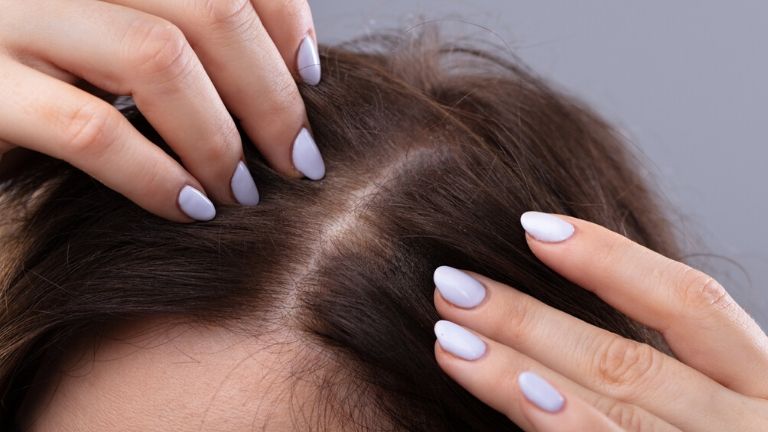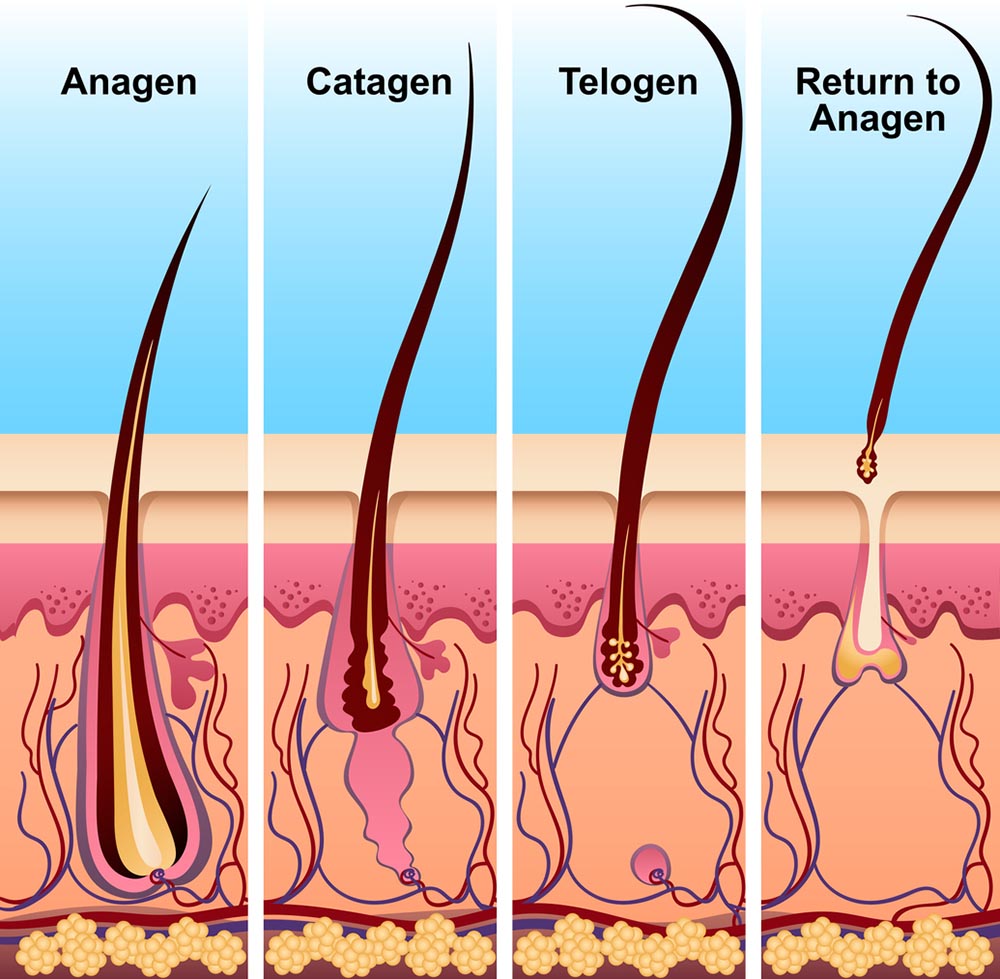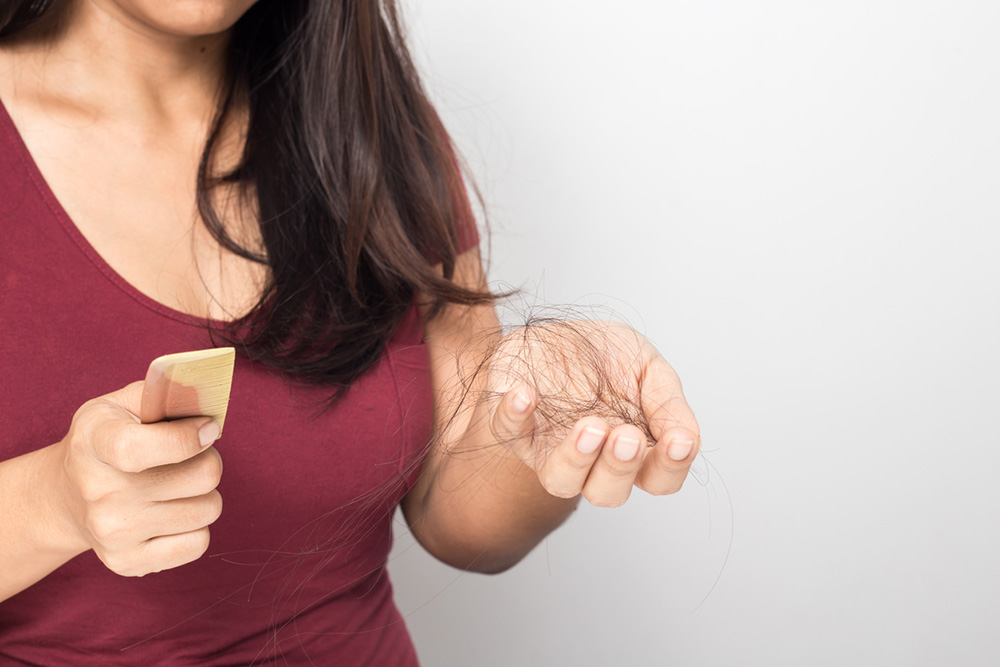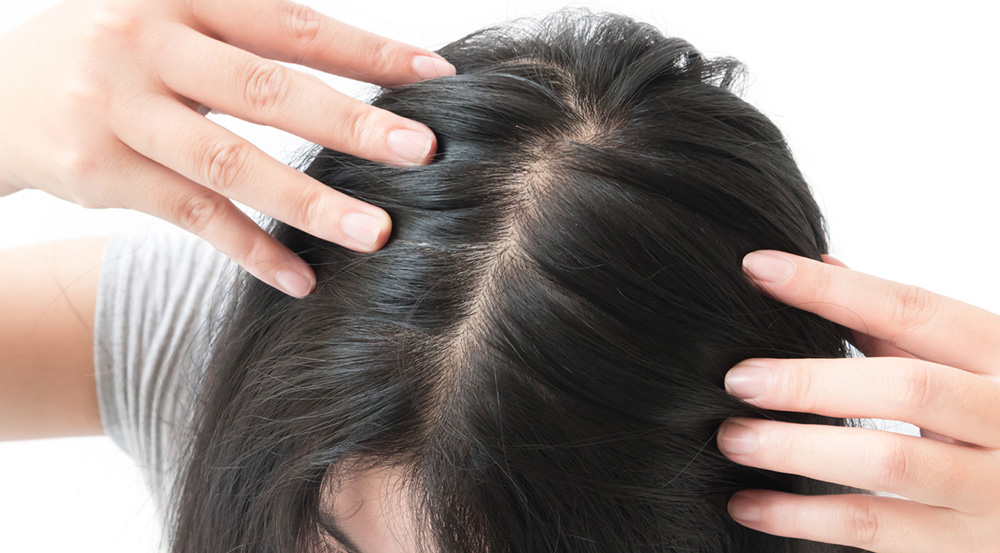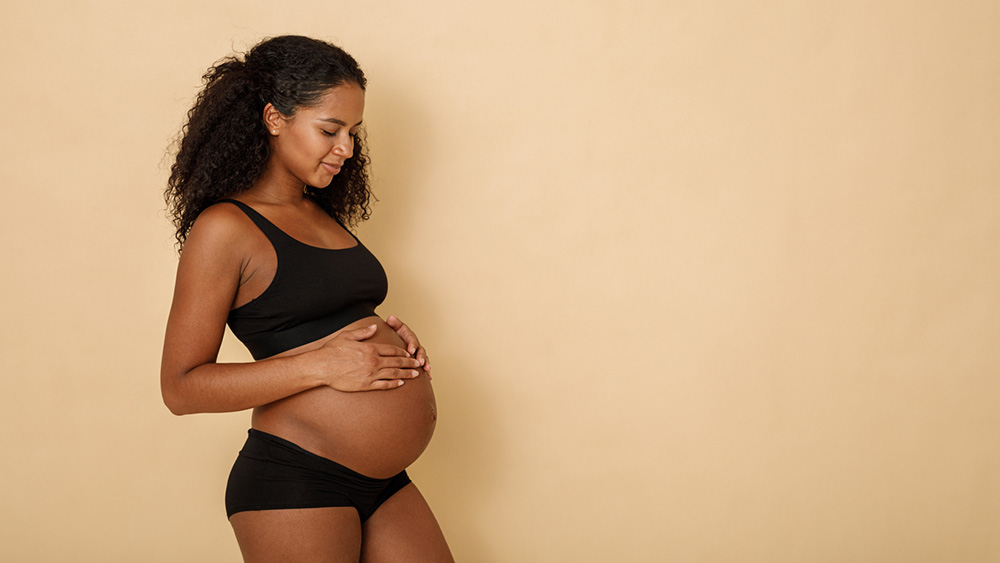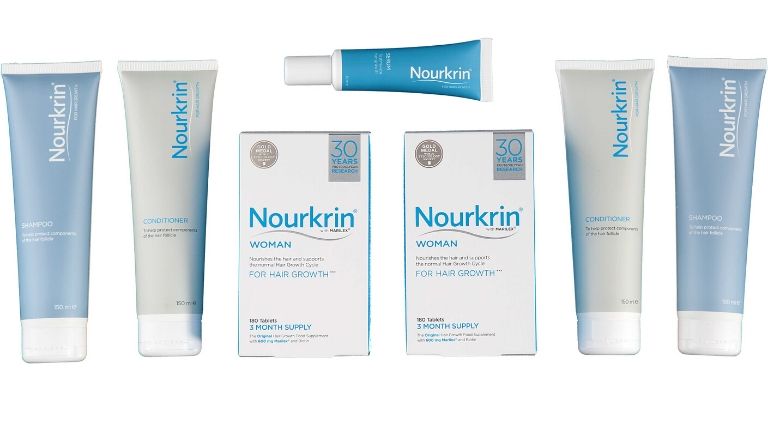Have you noticed more of your hair falling out than usual? Hair loss expert Dr Omar reveals five causes and a hair loss solution that works
For so many of us, hair is a defining feature that provides us all with character, confidence and personality.
Yet an estimated 8 million women in the UK experience some degree of hair loss or hair thinning at any given time.
If you have experienced hair thinning or hair loss but not spoken about your symptoms, you aren’t the only one, as 46 per cent of women who experience hair loss suffer in silence, feeling too insecure or embarrassed to talk about it.
We usually lose between 100 to 150 strands of hair a day
But the thing is, hair loss is completely normal and part of everyday life.
‘We usually lose between 100 to 150 strands of hair a day and what most people don’t know, is that your hair follicles have to go through three stages of the Hair Growth Cycle – and yes, one of these stages involves shedding hair,’ explains hair loss expert, Dr Omar.
A lot of people presume that hair loss isn’t always treatable but still end up buying into supplements and vitamins that aren’t even proven to help their hair loss woes.
If you are worried that your hair loss isn’t normal, fear not – there are some solutions that are proven to help.
First though you need to understand your hair growth cycle and what causes hair loss in the first place.
The Hair Growth Cycle:
Stage 1 – The Growth phase, also known as the Anagen phase, is where 85 to 90 per cent of the hair on our head is actively growing. This phase can last for three to five years.
Stage 2 – The Transition phase, aka the Catagen phase, is when your hair has stopped growing and disconnects from the hair follicle. Approximately only one per cent of the hair on our head is found in this phase at any given time, which has a duration of only one to two weeks.
Stage 3 – The Resting phase called the Telogen phase is when around ten to fifteen per cent of the hair on our head sits inactive in the follicle after reaching its full growth potential. That means its just sat on your head, no longer growing nor falling out (yet) – it’s stays there for around three to four months before shedding.
Which takes us back to the Growth (Anagen) phase, where your hair will start to grow again.
Signs your hair loss isn’t normal
If you begin to shed significantly more hair than usual or you notice that it doesn’t seem to be growing back, well, that’s when you can start to worry.
Depending on what has caused your hair loss, it can appear in many different ways. It can come on suddenly or gradually and can affect your scalp to varying degrees.
Signs and symptoms of hair loss (also known as alopecia) include:
- Gradual thinning on top of head – the most common type of hair loss, affecting both men and women.
- Circular or patchy bald spots – Some people experience smooth, coin-sized bald spots or patchy hair loss (alopecia areata). This type of hair loss usually affects just the scalp, but can sometimes occur in beards or eyebrows. Your skin may become itchy or painful before the hair starts to fall out.
- Full Scalp hair loss – conditions and medical treatments, such as chemotherapy can result in the loss of all or most of the hair, which usually grows back after treatment and over time.
- Sudden hair loss – A physical or emotional shock, or stress can cause hair to shed in excess. Handfuls of hair may come out when brushing or washing your hair. This type of hair loss usually causes diffuse hair thinning rather than bald patches.
What causes hair loss?
All types of hair loss, including alopecia, have one factor in common – a disrupted Hair Growth Cycle.
‘When hair loss occurs, regardless of the cause or the type, the Hair Growth Cycle is almost always affected, resulting in a shorter growth phase and extended resting phase, which leads to increased shedding and weaker regrowth,’ explains Dr Omar.
The realisation that your once healthy hair has started to thin or fall out can be a huge shock and send you on a desperate search for products to help.
there are so many potential triggers that cause hair loss, which makes it tricky to pinpoint the exact reason or cause
Unfortunately, too many hair growth products promise the world but don’t deliver, so be careful buying supplements out there that are no more than just a vitamin pill.
The thing is, there are so many potential triggers that cause hair loss, which makes it tricky to pinpoint the exact reason or cause and therefore how to fix or remedy it.
Other than obvious reasons such as heated hair styling appliances, hair styles such as pigtails and poor nutrition, Dr Omar is here to reveal five of the main causes of hair loss.
#1 Genetics
Hereditary hair loss is the most common cause of hair loss, known as male-pattern hair loss or female-pattern hair loss.
If you are likely to lose your hair due to genetics you may see a progressive, gradual reduction in hair volume as you age, such as a receding hairline and bald spots in men and thinning hair in women.
‘We are already genetically predisposed to having some hair follicles that are sensitive to hair loss, and some hair follicles that will continuously grow,’ says Dr Omar.
‘This is a natural occurrence and there’s not much we can do about it except to counteract that genetic predisposition with hair growth supplements to help rebalance the hair growth cycle’.
Rebalancing the hair growth cycle requires a specific treatment that helps to replace the ‘building blocks’ within our bodies. These are known as Proteoglycans, which help to regulate our hair growth.
We are already genetically predisposed to having some hair follicles that are sensitive to hair loss
Proteoglycans are biological molecules consisting of a core protein, present extensively throughout the body and as an essential part of the hair follicle.
‘Proteoglycans are one of the most common molecules throughout the human body. A number of which have roles in hair growth regeneration, growth and cycling,’ explains Dr Omar.
‘The body’s inability to produce the proteoglycans necessary for healthy hair growth can cause a disruption to the normal Hair Growth Cycle, resulting in hair loss and thinning.
The proteoglycans modulate hair growth factors that control the induction and duration of the growth phase. A disruption to the normal Hair Growth Cycle can therefore result in hair loss and hair thinning, which can worsen over time if left untreated or unnoticed.
Because of this, more hair strands will enter the Telogen (resting) phase earlier on in the cycle, leading to increased hair shedding and weaker regrowth.
A prolonged Telogen (resting) phase, means that fewer hair follicles are then being induced back into the Anagen (growth) phase again, which can result in no regrowth of hair.
If you’re experiencing too much hair loss or your hair is shedding excessively, you may have a disrupted Hair Growth Cycle and will need to consult your doctor or look into Proteoglycan Replacement Therapy.
Here’s how PRT works:
Clinically proven to induce hair follicles back into their growth phase, Nourkrin, which uses Marilex (a fish extract that provides a very unique and very specific combination of nutrients) is rich in key proteoglycans that are present in human hair follicles and are essential to hair follicle cycling.
Marilex interacts with specific growth factors that help influence and maintain a healthy Hair Growth Cycle.
‘The proteoglycans in Nourkrin have been extracted from fish, through a unique extraction process and provide a targeted supply of these essential nutrients to help re-balance the Hair Growth Cycle and stimulate existing hair growth,’ says Dr Omar. ‘This can take anything between three to 12 months with the minimum recommended treatment being a six month course’.
Proteoglycans are essential to hair growth cycle and those who lose their hair tend to have an imbalance. An essential part of the hair follicle they’re essentially biological molecules present extensively throughout the body too.
Nourkrin products are scientifically formulated to provide the correct nutrients required to normalise and maintain the Hair Growth Cycle, especially if there is an imbalance.
Basically, through PRT, hair follicles stuck in a dormant state are induced into the Anagen (growth) phase and as more and more hairs re-enter the growth (Anagen) phase, the resting (Telogen) phase is pushed back to normal levels – reducing the amount of hair shedding.
According to newly published clinical research, Proteoglycan Replacement Therapy, using Nourkrin promotes hair growth and hair quality with remarkably positive outcomes in several clinical trials.
This new published clinical paper is based on an outcome study where women with hair loss voluntarily started a six month course of treatment with Nourkrin Woman (600 mg Marilex per day).
By the midpoint of three months, the participants reported significant results and overall satisfaction with their hair growth recovery and appearance.
After six months, treatment satisfaction with Nourkrin Woman increased further as 96.49 per cent of participants reported improvement in their hair growth. What’s more, 97.37 per cent reported improvement in their hair appearance and quality.
Try: Nourkrin Woman, £50.95, 60 tablets, take two tablets each day. This supplement needs to be taken for a minimum of three to six months to have a visible affect.
#2 Hormonal fluctuations
As well as the obvious such as acne and weight gain, hormonal imbalance can also cause hair loss in both men and women.
For both genders, the specific hormone responsible for hair loss is called dihydrotestosterone (known as DHT) – a hormone that your body produces as a by-product of testosterone.
Both men and women need testosterone, as it is responsible for several functions in the body such as sex drive, muscle tissue and for healthy and strong bones.
Men have a larger amount of testosterone and a fairly small amount of female hormones (oestrogen). In women, this ratio is reversed as they have a smaller amount of testosterone and a larger amount of oestrogen (and progesterone).
the specific hormone responsible for hair loss is called dihydrotestosterone (known as DHT)
Female hormones (oestrogen and progesterone) are hair friendly as they keep hairs in their growth phase for the optimal length of time. However, androgens (male hormones) including testosterone, are not hair friendly, and can shorten the hair growth cycle.
Your body uses testosterone as a precursor for several other hormones, one being DHT. DHT affects the health and function of the follicles, forcing them to miniaturise and, ultimately, perish.
Therefore due to hormonal imbalance, an excess of androgens, such as testosterone causes hair loss. This is often called androgenic alopecia.
If you have a genetic predisposition to hair follicle sensitivity, a hormonal imbalance can affect your hair more than it would someone who does not have a predisposition.
‘As we age, especially in women, post-menopausal women or those with polycystic ovarian syndrome (PCOS), the hormone levels fluctuate and that change in your body manifests itself hair loss,’ explains Dr Omar.
During menopause, your body’s production of oestrogens can decline. Alongside this, your sensitivity to male hormones such as DHT can increase.
Menopausal hair loss usually happens between the ages of 50 and 60, with most women noticing a steady decline in their hair density. It can also occur in younger ages (30s and 40s), depending on what age you begin to enter the menopause.
#3 Stress
It is a fact that stress can negatively affect the health of your hair, resulting in hair loss.
These days stress is the highest it has ever been with longer work hours, demanding jobs and keeping up with the pressures of modern life in general.
Stress is a huge factor when it comes to hair loss and although it can be managed, it is still difficult to avoid.
If the stressful situation was due to a short term event such as moving house, then your hair should return to normal in about three to four months. But, if it is long-term stress is due to a relationship or work, then your hair is unlikely to improve unless serious action is taken to resolve your stress.
‘Most people are extremely stressed these days, it’s on an upward curve. What we find is that stress causes inflammation in the body that manifests in hair loss,’ says Dr Omar.
‘Stress causes inflammation in the body from heightened cortisol levels (that’s the body’s stress hormone), that manifests in hair loss. If you are sure your hair loss has been triggered by stress, managing your stress could be the key to returning to a healthy rate of hair growth,’ adds Dr Omar.
The reason for this is because stress can raise the male hormone androgen, which is responsible for the biological characteristics of males, including a deeper voice, body hair and increased muscle mass, as well as hair loss.
Stress causes inflammation in the body from heightened cortisol levels (that’s the body’s stress hormone), that manifests in hair loss
Stress can also significantly intensify the effects of androgenic alopecia. One of the main reasons for this is that stress often increases your body’s production of the stress hormone cortisol, which in turn can raise your body’s levels of testosterone.
Another type of hair loss caused by stress is called telogen effluvium. Unlike hormonal hair loss, telogen effluvium hair loss is temporary and once the stress has been dealt with your hair should grow back naturally.
Telogen effluvium usually results in a sudden thinning of hair across the entire scalp. You will probably notice more hair on your pillow, in the shower, bath or on your hairbrush.
Hair loss caused by telogen effluvium affects your hairline by forcing hairs into the telogen (resting) phase, the final phase of your hair’s growth cycle. This can cause your hairs to fall out without replacement hairs growing to replace them.
You’ll usually notice stress related hair loss two to three months after the stressful event has occurred.
Read more: Hair loss – ‘Wedding stress made my hair fall out – here’s how I got it back’
Stress may also trigger scalp problems, such as dandruff, disrupt eating habits and mess with the digestive system, all of which can have a negative impact on hair growth.
#4 Health and medication
‘Many health conditions can cause hair loss, such as diabetes and thyroid problems but some medication has side effects that also cause hair loss,’ explains Dr Omar.
Hair loss is a common side effect of many medications used to treat conditions such as cancer, high blood pressure, arthritis, depression and heart problems.
These medications interfere with or damage the hair follicles, disrupting the hair growth cycle at different stages. This can lead to two types of hair loss – telogen effluvium and anagen effluvium.
Drug-induced telogen effluvium hair loss usually appears within two to four months after taking the medication/drug. The medication causes the hair follicles to go into their resting phase (telogen) and fall out too early.
Anagen effluvium is hair loss that occurs during the anagen (growth) phase of the hair cycle. The medication prevents the cells, which produce new hairs, from dividing normally. This type of hair loss usually occurs within a few days to weeks after taking the medication.
This type of hair loss is most common in those who are having chemotherapy treatment for cancer. This often causes people to lose most or all of their hair, not only on their head but also their eyebrows, eyelashes and other body hair.
Most of the time, drugs and medication only cause temporary hair loss that goes away once you’ve adjusted to or stopped taking the medicine.
#5 Having a baby
For most women, pregnancy can actually make your hair thicker thanks to the high levels of the female hormone oestrogen, which slows down hair shedding.
‘During pregnancy the hormone levels protecting the baby also protect your hair and elongates that hair growth cycle,’ says Dr Omar.
However some expectant mothers will experience hair thinning during pregnancy, especially during their first trimester.
This is due to the stress that is put on the body during pregnancy, as the balance of hormones changes significantly to support the growing baby.
This stress may cause the hair on your head to enter into the telogen (resting) phase of the hair life cycle earlier than normal, and the levels of shedding experienced will start to exceed the average 100 hairs a day significantly, resulting in visibly thinner hair.
After having a baby 50 per cent of women will suffer from excessive hair loss
This may not happen right away though, it could take two to four months to notice dramatic thinning and won’t result in permanent hair loss.
Many women notice hair loss or thinning months after pregnancy too, but this is not true hair loss, but rather excessive hair shedding caused by a drop in the hormone oestrogen.
‘After having a baby 50 per cent of women will suffer from excessive hair loss. This is due to the hormonal changes that occur after childbirth, known as postpartum hair loss,’ explains Dr Omar.
Hair which has grown abundantly during the pregnancy due to the increased hormonal presence, returns to normal post-partum and this causes those hairs to shed. Rest assured though, as those hormone levels return to normal, so too will the hair shedding.
What’s more, pregnant women are at a higher risk of developing iron deficiency anaemia. Iron deficiency happens when you don’t have enough red blood cells to get oxygen to different tissues in the body.
This can cause hair thinning along with other symptoms such as fatigue, irregular heartbeat, shortness of breath and headaches.
WIN Nourkrin hair growth products worth £380
Healthista and Nourkrin are giving THREE lucky readers the chance to WIN hair growth products worth a massive £380. Click here for your chance to win.
Relevant Healthista Content
Blake Lively reveals secret behind her glossy hair is COCONUT OIL
Got puffy eyes? Hair loss? These 7 vitamin deficiency signs could be ruining your looks
60 second smoothie for hair, skin and nails – tropical splash
Losing her hair and having asthma didn’t stop Joanna Rowsell bagging an Olympic medal
More Healthista Content
What’s sugar really doing to your mouth? The dentist’s guide
Blue Monday sorted – 5 proven ways to boost your mood through food
Is mindfulness the key to better sex?
The 30-minute eye lift that transformed this woman’s face
Like this article? Sign up to our newsletter to get more articles like this delivered straight to your inbox.



